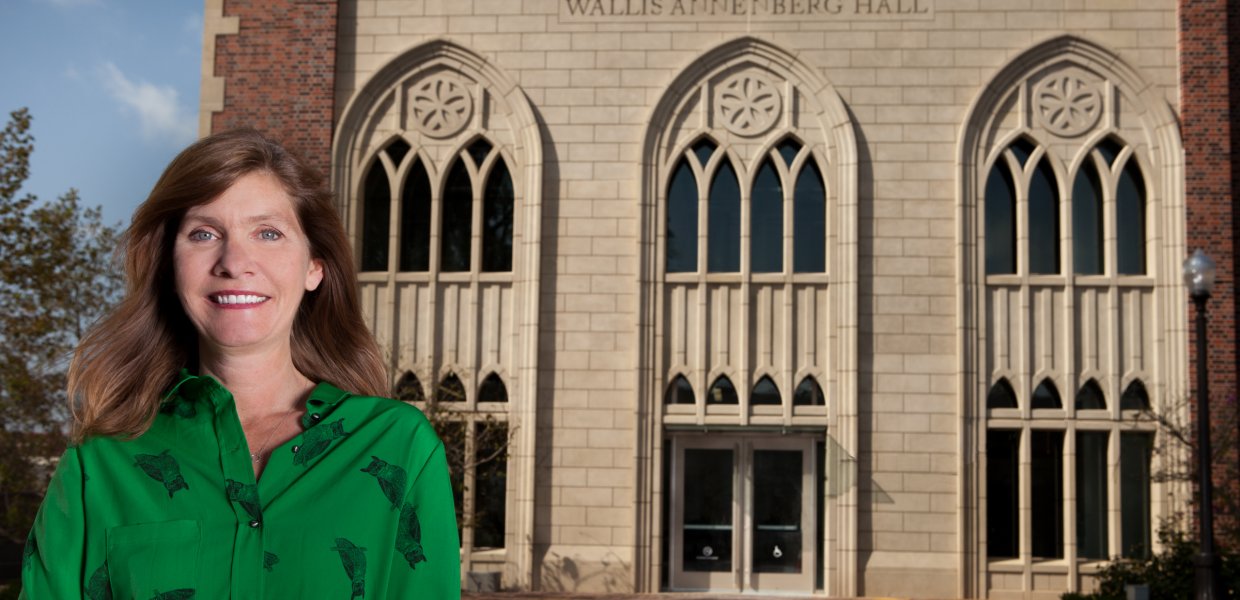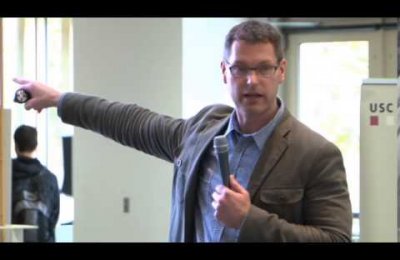The USC Annenberg School for Communication and Journalism announced today that Dean Ernest J. Wilson III will appoint a new Director of its School of Communication in the summer of 2014.
The School will pull from its deep bench of accomplished scholars to promote Professor Sarah Banet-Weiser, who began her career at the School as an assistant professor in 1999. A widely respected expert in gender and media, American studies, youth culture and popular and consumer culture, Banet-Weiser is an award-winning author who has edited and authored a number of books, journals and journal articles.
Besides holding a professorship in the School of Communication, she also has a joint appointment with USC’s department of American Studies and Ethnicity.
Banet-Weiser will take over the post from School of Communication Director Larry Gross. Gross has led the School since 2003, is a past president of the International Communication Association and a former Guggenheim Fellow. A specialist in the areas of media and culture, art and communication, visual communication and media portrayals of minorities, Gross is known for helping to found the field of gay and lesbian studies.
Gross is Vice-Dean of the entire USC Annenberg School for Communication and Journalism and will retain that role, as well as his position as a faculty member.
“Professor Gross has a remarkable record of achievement and excellence during his time as Director. He has set high standards, and I look forward to Larry’s continued good work as he remains my Vice-Dean for USC Annenberg as a whole,” said Dean Wilson.
“We’re transitioning seamlessly from one star to another as we shift leadership of the School of Communication,” Wilson said. “Professor Banet-Weiser is a renowned scholar, an award-winning author, a beloved teacher and an effective leader. I couldn’t be happier that she has agreed to take on this role and continue to build on the foundation of excellence in scholarship and education that the School is known for.”
For Banet-Weiser, the opportunity to lead the School is a chance to use what she’s learned about the discipline of communication from her USC Annenberg colleagues to help the School move forward at a time when the field is constantly changing.
“During my 13 years here at USC Annenberg, my own understanding and contributions to the field have been indelibly shaped by the range and breadth of this department and the faculty who work here,” Banet-Weiser said.
“While my own scholarship emerges from the subfield of culture and communication, I'm looking forward to continuing to build the department in all areas of the field – from health communication to organizational communication to rhetoric to new and digital technologies and other subfields. We have great opportunities and resources here at USC Annenberg, and I am honored to be asked to help continue building our department in the years to come.”
Gross said he and Banet-Weiser will work closely together over the next year to build a smooth transition of leadership. He called her “extraordinarily appropriate” for the role, because of her deep knowledge of the School and her stewardship skills.
Banet-Weiser is uniquely qualified to lead a school in a discipline that is unlike many others, Gross said.
“She’s broad-minded in her approach to a fairly complicated field. A key to our program has been that it balances heterogeneous approaches and methods, and she’s committed to that, as I have been. This is not a school with a single view of what questions to look at and what constitutes scholarship. We’re quite diverse in that way, and that’s one of our strengths,” Gross said.
Beyond being a respected intellectual and scholar, Banet-Weiser has a generosity of spirit and a commitment to social values that will be invaluable to the School, Gross said.
“She sees the academic mission as one that has wider social responsibilities that translate into what you teach, how you teach and how you think about working with students. It’s not an ivory tower mentality, but one that understands that the University, as a privileged institution, must contribute to society,” Gross said.
Banet-Weiser came to USC Annenberg to take her first tenure-track position after earning her Ph.D. from UC San Diego in 1995. She rose to full professor, won a USC Mellon Mentoring Award for her work with graduate students and also became a distinguished fellow for the USC Center for Excellence in Teaching.
Her teaching and research interests include feminist theory, race and the media, youth culture, popular and consumer culture, and citizenship and national identity. She teaches courses in culture and communication, gender and media, youth culture, feminist theory and cultural studies.
Her book Authentic™: The Politics of Ambivalence in a Brand Culture (New York University Press), which won the 2013 Outstanding Book Award from the International Communication Association, examines brand culture, youth, and political possibility through an investigation of self-branding, creativity, politics and religion.
Also published in 2012 was Commodity Activism: Cultural Resistance in Neoliberal Times (New York University Press), co-edited with Roopali Mukherjee.
Her first book, The Most Beautiful Girl in the World: Beauty Pageants and National Identity (University of California Press, 1999), explores a popular cultural ritual, the beauty pageant, as a space in which national identities, desires, and anxieties about race and gender are played out.
She has also authored a book on consumer citizenship and the children's cable network: Kids Rule! Nickelodeon and Consumer Citizenship (Duke University Press, 2007), in addition to her co-edited book, Cable Visions: Television Beyond Broadcasting, co-edited with Cynthia Chris and Anthony Freitas (New York University Press, 2007). She has published articles in the academic journals Critical Studies and Media Communication, Feminist Theory, the International Journal of Communication, and Television and New Media, among others. For six years, until 2013, she co-edited a book series with New York University Press, Critical Cultural Communication.
For the past four years, she has edited American Quarterly, the flagship journal of the American Studies Association.








